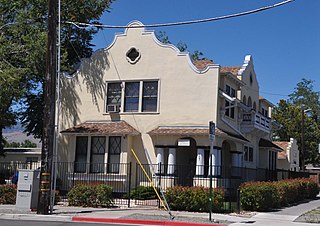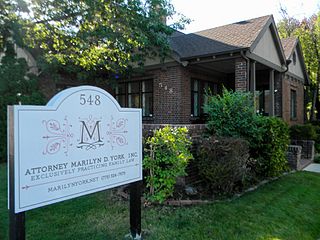
This is a list of sites in Minnesota which are included in the National Register of Historic Places. There are more than 1,700 properties and historic districts listed on the NRHP; each of Minnesota's 87 counties has at least 2 listings. Twenty-two sites are also National Historic Landmarks.

This is a list of the National Register of Historic Places listings in Winona County, Minnesota. It is intended to be a complete list of the properties and districts on the National Register of Historic Places in Winona County, Minnesota, United States. The locations of National Register properties and districts for which the latitude and longitude coordinates are included below, may be seen in an online map.

The Twaddle Mansion was built for rancher Ebenezer "Eben" Twaddle in Reno, Nevada. The two-story frame house was built in 1905 by contractor Benjamin Leon in the Colonial Revival style, an unusual choice for Nevada, and executed with particular opulence.

The Francovich House, at 557 Washington St. in Reno, Nevada, USA, was built during 1899–1900. It was listed on the National Register of Historic Places in 1983 and was delisted later the same year, when it was moved to save it from demolition.

The Humphrey House in Reno, Nevada, located at 467 Ralston St., is a historic house built in 1906. Designed by Reno architect Fred Schadler, it is significant architecturally and for association with Nevada governors Tasker Oddie and Emmet Boyle, who were guests there. It was listed on the National Register of Historic Places in 1983.

The First United Methodist Church is a Methodist church that was founded in 1868 in Reno, Nevada. In 1868 the first meetings were held in the local schoolhouse on the corner of what is now First and Sierra Streets. In 1871 The first church was erected and dedicated on Sierra Street between First and Second Streets. In the early 1900s the wood-framed church was moved to the back of the lot and a new brick building was added to it. And finally in 1925 plans for a new building were made. Designed by Wythe, Blaken, and Olson of Oakland, the church is one of the first poured concrete buildings in Reno and utilizes Gothic Revival architectural themes. The corner stone for the current historical building was placed in 1926, with the building being dedicated in December of that same year. It was listed on the National Register of Historic Places in 1983; the listing included two contributing buildings. The second building is a parish house designed by local architect Donald Parsons and built in c.1840. In 1965 another addition was done to add on what is currently the fellowship hall, and Sunday school class rooms.

The El Cortez Hotel, at 239 W. 2nd St. in Reno, Nevada, is a historic Art Deco-style hotel that was designed by Reno architects George A. Ferris & Son and was built in 1931. It was listed on the National Register of Historic Places in 1984.
George A. Ferris & Son was an architectural firm in Reno, Nevada, consisting of partners George Ashmead Ferris (1859-1948) and his son Lehman "Monk" Ferris (1893-1996). The partnership lasted from just 1928 to 1932; both father and son however were individually prominent.

The Joseph H. Gray House, at 457 Court St. in Reno, Nevada, United States, is a historic house that was built in 1911. It includes Colonial Revival details in a form having Queen Anne-style massing. It was listed on the National Register of Historic Places in 1987. The listing included two contributing buildings.

The Tyson House, at 242 W. Liberty St. in Reno, Nevada, is a historic house that was built during 1904–1906 and that was once owned by the family of Nevada senator Francis Newlands. It includes Colonial Revival elements but is primarily of Queen Anne architectural style.

Update: Unfortunately this was torn down.

The William J. Graham House, at 548 California Ave. in Reno, Nevada, United States, is a historic Tudor Revival house that was built in 1928. It was designed by George A. Schastey. It was listed on the National Register of Historic Places (NRHP) in 1983.

The Pearl Upson House, at 937 Jones St. in Reno, Nevada, United States, is a historic, two-story, red brick, simplified-Queen Anne-style house that was built in 1902. Also known as the Arrizabalaga House, it was listed on the National Register of Historic Places in 2003.

The McCarthy–Platt House, at 1000 Plumas St. in Reno, Nevada, is a historic house that was originally built in 1900 and was redesigned in 1925 by architect Frederic J. DeLongchamps. It includes Colonial Revival architecture elements. It was listed on the National Register of Historic Places in 1984. It was deemed significant for association with its architect Frederic J. DeLongchamps, for its associations with Reno developer Charles McCarthy and Nevada attorney/politician Samuel Platt, and "as a noteworthy example" of Colonial Revival architecture in Nevada.

With this motto, “The measure of the worth of an organization to its community, is bound in its ability to embrace opportunities for service” the Twentieth Century Club had its beginning in 1894. Mrs. Walter McNab Miller served as President for an original group of 84 women. The Club's name was chosen to reflect a look forward to the future and the beginning of the new century.

The Burke–Berryman House, at 418 Cheney St. in Reno, Nevada, is a historic house with elements of Queen Anne and Colonial Revival architecture. It was built c.1909-10 as a rental house in the "Burke's Addition" area of Reno, developed by Charles H. Burke.

The Joseph Giraud House, at 442 Flint St. in Reno, Nevada, United States, is a historic house that was designed by prominent Nevada architect Frederick DeLongchamps and was built in 1914. Also known as the Hardy House, it was listed on the National Register of Historic Places in 1984.

The Levy House, at 111-121 California Ave. in Reno, Nevada, is a historic Classical Revival-style house that was built in 1906. It was home of William Levy, a merchant and mining businessman.

The Nortonia Boarding House, at 150 Ridge St. in Reno, Nevada, was built in c.1900-1904. In 1906 it was purchased by Norton, who changed it to a boarding house, and it was also extended then. It is primarily Queen Anne in style but includes elements of Colonial Revival architecture as well. It was listed on the National Register of Historic Places in 1983. It is notable as "one of the best" surviving Queen Anne houses in Reno.

The Reno National Bank-First Interstate Bank, at 204 N. Virginia St. in Reno, Nevada, is a Classical Revival building that was built in 1915. It was designed by architect Frederick J. DeLongchamps. It was listed on the National Register of Historic Places in 1986. It was listed as part of a Thematic Resources study of the architecture of DeLongchamps.





















